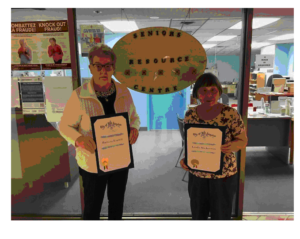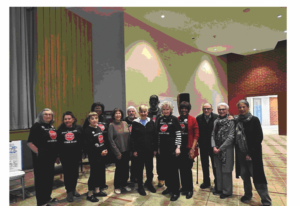30 Jun BEST PRACTICES TO DETER SCAMMERS
FOLLOW or SHARE

Dr. Sherry McCoy PhD
is a freelance writer & actor for the Stop Senior Scams Acting Program (SSSAP) in Los Angeles. Follow SSSAP on Facebook . For more info re: SSSAP, contact Adrienne Omansky at SSSAP4U@gmail.com. Questions for the writer should be directed to “Dear Sherry” at Not Born Yesterday! P.O. Box 722, Brea, CA 92822 or nbynews@juno.com.
BEST PRACTICES TO DETER SCAMMERS
Dr. Sherry McCoy, PhD – Stop Senior Scams ℠ Acting Program
July of 2023 is upon us! Half the year is behind us, and another half lies ahead. Who knows what those months will bring. We can only hope, for instance, that the next six months will unfold with goodness for all in our world, and that no one will fall prey to scammers. In an ideal world, this might happen. But we do not live in an ideal world; we live in a real one. And just like the ocean is filled with dolphins, we must remember that it is also filled with sharks. So let us be mindful that our world today is peopled by good law-abiding citizens, and those who are not, e.g., scammers — those who use lies in an attempt to rob us of our finances, well-being, and peace of mind. Our best line of defense to protect ourselves from fraudsters and their nefarious schemes, is to develop and maintain a pro-active commitment to staying consciously aware of the reality we live in. Rachel Tobac, an “ethical hacker” and CEO of Social Proof Security, who appeared on television in a recent 60 Minutes episode* on how digital scammers target people from millennials to seniors, calls this pro-active attitude “being politely paranoid.” So, let’s take a look at some of the ways we can practice “being politely paranoid” in an effort to thwart scammers and maximize fraud prevention in our lives.
GOOD HABITS IN FRAUD PREVENTION
Make it a regular everyday practice to report all scam emails, texts, phone calls, mail, etc. to the Federal Trade Commission (FTC). — If even a few of us took this action every day, great headway would be made in the battle to stop senior scams. Imagine, then, what would happen if all of us made such a commitment! The importance of reporting scams AND attempted scams cannot be overstated. Simply put – Law enforcement can’t fight a problem it doesn’t know anything about. If we want to stop the problem of scams that target seniors, we have got to shine a light on that problem. And one of the best ways to do that is to report, report, report. Let’s do it!
Recognize that anyone can be a victim of fraud. – A recent FBI report indicates that Americans lost more than $10B to online scams and digital fraud*. This number is staggering. Yet, when you consider that only a very tiny fraction of fraud crimes are actually reported, it means that the real amount of money lost to fraudsters is significantly higher! It also means that a significant number of people who were defrauded by scammers last year did not report those crimes. In addition, statistics show that nowadays, we are more likely to be the victim of online theft than a break-in at home*. And fraudsters are upping their game, using AI (artificial intelligence) and voice-cloning to make their lies more believable, and thus more dangerous to the general public. Rachel Tobac* reiterated this point on 60 Minutes, noting what happens when she demonstrates hacking into someone’s phone with AI voice-cloning technology: “In fact, when I do that type of attack, every single time, the person falls for it.”
Code Word — Consider having a “code word” with family members, your spouse, and/or close friends. If you get an unsolicited call from someone claiming to be a loved one who is in some kind of trouble/emergency and needs your help right away, ask the caller for the “code word.” If the caller knows the “code word,” you’ll know the call is legit. If the caller doesn’t know the “code word,” then the call is clearly a scam! Just hang up!
Take 5 / Tell 2** – We first learned about the “Take 5 / Tell 2” campaign to steer clear of fraud from our friends in Canada at the Senior Resource Center Saint John, N.B. The idea behind “Take 5 / Tell 2” is this — Make a commitment to yourself to take 5 minutes to chill, and talk to 2 people, before you respond to an unsolicited text message, email, phone call that is alarming. This is a step that will help us “get out from under the ether” of a scammer’s intent to trick us into believing their lies are truth. When we’re in a state of panic, we are not thinking clearly and tend to make poor choices. Taking 5 minutes to chill and speak with at least 2 other people about the matter can help get us back on track, so we can reasonably assess the situation and act from a place of reason, not from fear.
Stay current on scams that target seniors – It’s important to stay up to date on what’s going on in the world with scams, especially those that target seniors. The more we know about scams and tactics used by scammers, the more we develop our awareness in this arena, the better off we will be. Knowledge is a powerful deterrent to fraud. Read all you can about scams and share what you know with others.
Be Present — Practice being aware of your surroundings and staying focused in the present moment. This goes a long way in helping us stay grounded and aware of what’s going on around us at every moment. Check in with yourself throughout the day as you go about your daily activities. Be kind to yourself as you simply note where your mind is wandering. As your self-awareness increases, it will become easier to stay focused in the present moment!
Offer Encouragement — Encourage those who have been the victim of a scam to report what happened to the FTC and local or federal law enforcement agencies. Discuss the importance of reporting scams. If you or someone you know is the victim of a scam, talk about what happened in a safe environment, i.e., with friends and family who are non-judgmental, or with a scam support group. Scam shaming is a real problem in our society. We tend to blame the victim rather than directing our ire where it belongs — at the criminals who perpetrated the crimes in the first place. This needs to change. One way we can stop blaming scam victims is to make a commitment to notice the language we use to think and talk about fraud. Are we subtlety blaming the victim without realizing it? Note the language differences in the following examples: A)”Mary got duped out of $1,000″ or “John was bilked out of his life savings.” B)”A criminal stole $1,000 from Mary in an IRS impostor scam” or “A thief stole John’s life savings in a phony investment scheme.”
In example A) the language in the statements subtlety blames the victims, whereas, in example B) the language rightly places the responsibility for the crimes on the perpetrators, not on the victims.
Remember This Important Red Flag – If it sounds too good to be true, it probably is!
Be Empowered. Find Your Voice. Speak Out About Fraud!
WHERE TO REPORT SCAMS
Federal Trade Commission at 877-382-4357 or online at https://www.ftccomplaintassistant.gov/#crnt&panel1-1.
For questions about Medicare fraud / abuse, contact Senior Medicare Patrol (SMP) at 1-855-613-7080.
U.S. Senate Special Committee on Aging’s Fraud Hotline at 1-855-303-9470.
REFERENCES
*CBS News, “Ethical hacker scams 60 Minutes staffer to show how easy digital theft is,” by Aliza Chasan, May 21, 2023, https://www-cbsnews-com.cdn.ampproject.org/c/s/www.cbsnews.com/amp/news/how-digital-theft-targets-people-from-millennials-to-seniors-60-minutes-2023-05-21/#x
**CBC News, “Here are the top scams in Ontario and tips on how to avoid them,” by Nicole Brockbank, March 02, 2023, https://www.cbc.ca/news/canada/toronto/fraud-scams-tips-avoid-ontario-1.6764432
 FRIENDS OF SSSAP
FRIENDS OF SSSAP
Los Angeles City Council President Paul Krekorian acknowledged Pat Everett (left), Volunteer and Canadian Ambassador for SSSAP; and, Linda Nickerson, Executive Director of Senior Resource Center Saint John, N.B, Cañada, with certificates for their collaboration with SSSAP in Senior fraud education and prevention.
 RECENT SSSAP EVENTS
RECENT SSSAP EVENTS
SSSAP Ensemble Cast and Chai Village LA Members, June 15, 2023, Beverly Hills Performance.
UPCOMING SSSAP EVENTS
On August 17th, at 2:PM, Los Angeles Public Library — Exposition Park Branch, 3900 S. Western Ave., L.A 90062. Contact: Eugene Owens Librarian for information.
Remember: You may be a target, but you don’t have to be a victim!
Dr. Sherry McCoy, PhD is a freelance writer & actor for the Stop Senior Scams ℠ Acting Program (SSSAP) in Los Angeles. Follow SSSAP on Facebook at https://www.facebook.com/SSSAP2016/?fref=ts. For more info re: SSSAP, contact Adrienne Omansky at SSSAP4U@gmail.com. Questions for the writer should be directed to “Dear Sherry” at Not Born Yesterday! P.O. Box 722, Brea, CA 92822 or nbynews@juno.com.




Sorry, the comment form is closed at this time.